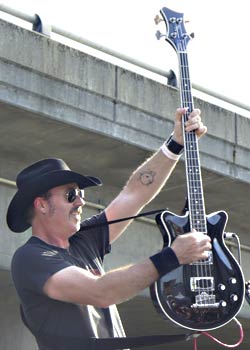The Georgetown Music Festival couldn’t have been executed under better circumstances this weekend, given the exceptional (and short-lived) summery weather—but the fact remains that it’s a challenge to recruit crowds to Seattle’s southern, industrial neighborhood. While foot traffic seemed steady throughout both days, it was surprising how thin the crowd was for headliners Earlimart on Saturday and the Supersuckers on Sunday. “One issue is the location of Georgetown itself,” acknowledged festival promoter Stefan Schachtell. “We get e-mails every year from people saying, ‘This festival sounds like so much fun! Are there any hotels near Georgetown you can recommend?’ It’s funny that this great neighborhood is just off the mental map of Seattleites. That being said, we’ve made both a financial and mental commitment to making this the next great festival of Seattle, and we’re going to pursue the heady dream of giving exposure to a ton of well-deserving bands and a well-deserving neighborhood.”
As someone who recently purchased a Rick Springfield album and resurrected the highly questionable habit of watching daytime soap opera The Young and the Restless, I’m on shaky ground when it comes to criticizing shallow pop-culture phenomena like American Idol. However, I am truly baffled by the enduring popularity of that show. Even if the judges were respectable, appealing, and entertaining figures (mean-spiritedness is only amusing for so long), the production values are so garish that I find it hard to discern whether someone is actually in possession of raw talent. I don’t care how splendid a rendition of a John Lennon song is, if it’s aesthetically augmented by blinking violet neon lights and underscored by bloodless synthesizers, I’m turned off.
Given that perspective, when local AI contestant Blake Lewis sauntered into the High Dive on Saturday while I was in the middle of DJ’ing KEXP’s live Audioasis broadcast, I wasn’t nearly as excited as the gaggle of girls trailing after him requesting autographs and pictures while he attempted to give away an unwanted Dick’s cheeseburger. Even stranger was the fact that the guy struck up a conversation with me outside the club afterward, apparently because he admired the tattoo I have of a turntable on my arm. “I’m getting one on my back,” he told me, explaining that he still needed “to get the money together,” and that he was hoping to have the work done by Kat from the Miami Ink television show. When I confessed I’d never made it through an entire episode of American Idol, he was pretty gracious, saying, “Neither have I!” and confiding that the only reason he wanted to be on the show in the first place was to land a spot on the forthcoming tour with fellow Idol contestants. Well, congratulations, Mr. Lewis—I hope that life after Simon Cowell takes you somewhere more interesting.
Much more in line with my tastes was the scene over at the Sunset later that night, when San Francisco’s Thee Ohsees and the Intelligence dutifully tore up the floor and stage to the delight of a small but highly enthusiastic crowd that included the Light’s frontman, Craig Chambers, and the Shins’ bassist, Dave Hernandez. Most impressive to my ears was local opening act the Factums, a noisy, experimental trio reminiscent of Unwound and featuring the former drummer for the Intelligence.
Witnessing the growth of promising, progressive new bands such as the Factums makes it that much harder to swallow the increasingly disturbing message coming from Seattle City Hall regarding proposed nightlife restrictions. What was encouraging was the turnout at Monday’s City Council hearing to review and solicit public comment on council member Sally Clark‘s potential nightlife legislation. The music community’s presence was impressive, particularly (and understandably) the participation of club owners. Among the attendees were the Tractor Tavern’s Dan Cowan, the Sunset’s Heidi Park, El Corazon’s Dana Sims, High Dive’s Eric Poll, Jason Lajeunesse and Mike Meckling from Neumo’s, Tin Hat/Jules Maes owner John Lemaster, and Skylark’s Jessie Summa-Kusiak. There were plenty of other music-community figures there, including Billions booking agent Ali Hendrick and No Depression publisher Kyla Fairchild (along with her husband and Hattie’s Hat co-owner, Ron Wilkowski). What were in conspicuously short supply were musicians themselves. Musicians, this is a real threat to your ability to play out in public. Make your voices heard at one of the next hearings: June 7 (9:30 a.m. in council chambers, City Hall, 600 Fourth Ave., 2nd floor) and June 21 (6 p.m. at University Heights Center, 5031 University Way N.E.).








